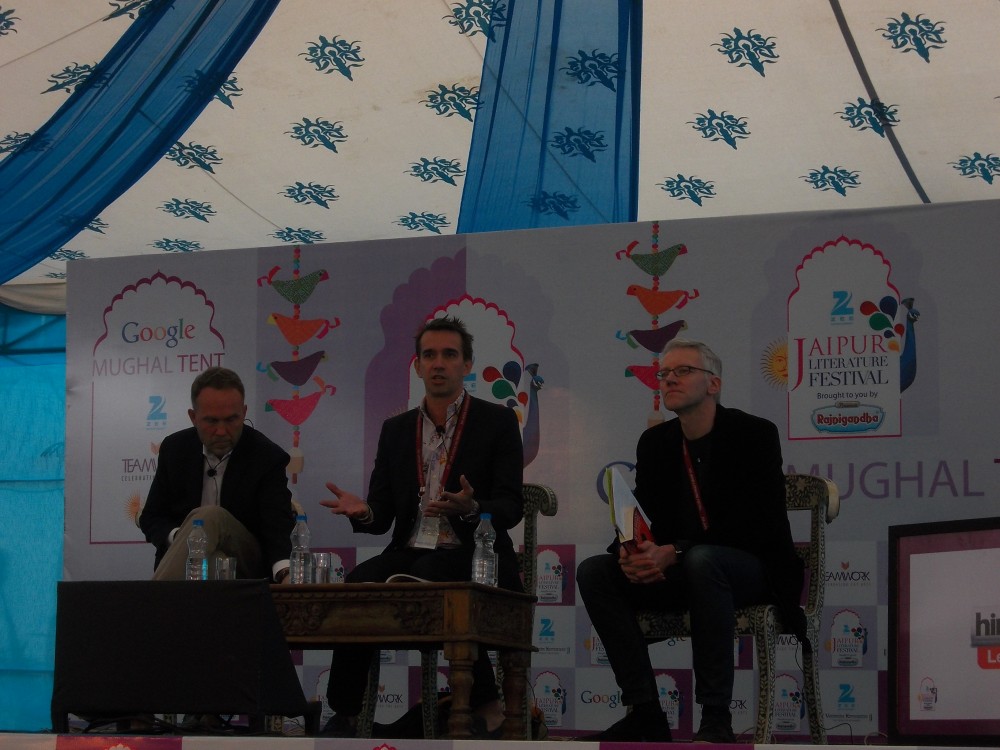
Jaipur, Feb 4 (IANS) Study of the Crusades - "the first big clash of civilisations" - is still relevant in a world where religious conflict still rages and Western armies recently intervened in the Middle East, says a scholar who seeks to overturn the millennium-old, West-centric view of their origins.
"The conventional history holds the First Crusade began with Pope Urban II's call in 1095 to free Jerusalem... prompting big armour-wearing knights on white horses to set out to free the Holy City but this is not the full story," historian Peter Frankopan told IANS in an interview.
"Jerusalem was lost (to Christians) in 636 A.D. Why would Christian rulers wait over 450 years to recapture it?" said Frankopan, who spoke about the First Crusade (1096-99) and its origins at the Jaipur Literature Festival here last month.
The director of the Oxford's Centre for Byzantine Research seeks to fill the missing details and provide a contrary theory in his book "The First Crusade: The Call from the East" (2012), contending the expedition's genesis was not in Rome, but Constantinople, and it was not the Pope, but Byzantine Emperor Alexios I who was the real motivating force, with the objective of shoring up his Turkish-threatened dominions.
Frankopan argues Alexios (reigned 1081-1118) pitched his case for Western strategic military aid most skilfully after his bold but ill-thought policies further placed his empire in danger from the rising power of the Seljuks, who had, in 1077, defeated his predecessor and annexed half the Byzantine holdings in Asia Minor (present-day Turkey).
Alexios "knew how to appeal to Westerners" and held the objective of Jerusalem to bolster his case, he said.
Thus was launched the First Crusade, led by prominent European nobles like Godfrey of Bouillon, Raymond IV of Toulouse, Bohemond of Taranto (and his nephew Tancred) and others.
Comprising at least four different contingents (from north and south France, Flanders, Germany, and southern Italy) who did not always cooperate with each other despite sharing the same objective, it was the most successful among the seven (or nine) main crusades.
The expedition advanced through Asia Minor (the only one to achieve this feat) to conquer Jerusalem in 1099 (though the city was lost to Saladin in 1187, briefly recovered in 1229, lost for good in 1244 - being only captured again by a Western army in 1917).
Frankopan said Alexios made all the crusade's leaders swear solemn oaths to acknowledge his suzerainty and relinquish to him any Byzantine dominions they recaptured but this was mostly flouted by them.
While Godfrey was crowned ruler of the new Latin Kingdom of Jerusalem (but refused to take the title of king), Bohemond created a principality centred on Antioch (which he refused to return to Alexius), Godfrey's brother (and successor) Baldwin in Edessa and Raymond in Tripoli.
"To cover up their broken oaths, they (the Crusaders) painted the Byzantines as bad and untrustworthy, unsoldierly, that they fought like women, practiced dark magic...," he said, adding this "constant campaign of villification" tarnished the Byzantine cause and contribution for over a thousand years in the Western world and scholarship.
An offshoot was the notorious Fourth Crusade (1202-04) which diverged from its original aim to swing to capture and sack Constantinople instead.
Frankopan said his book was based on interpretations of primary documents from the Byzantine side, mostly in Greek but also in Armenian and Aramaic, unlike historians like Sir Steven Runciman and Thomas Asbridge who had focussed mainly on Latin and other West European language sources.
Lebanese-born French writer Amin Maalouf, who offers the other viewpoint in "The Crusades Through Arab Eyes", does not focus much on the First Crusade, he said.
On why the Crusades were still important, he said there were two reasons. "One, because we are in an era of religious conflict and, secondly, the purpose of history is two-fold - to know what happened in the past and draw lessons for the present and the future - the Crusades were the first big clash of civilizations."
Rubber check dams suggested to conserve Yamuna water
Agra, Jan 31 (IANS) Uttar Pradesh is looking to install rubber check dams in the Yamuna river c
NTA: NTA has been in the headlines ever since the NEET paper leak. NTA conducts many major examin
Ban on Wheat Export: Wheat is not cheaper than export ban, only 54 paise relief in 12 days
Despite the ban on the export of wheat, its prices in the domestic market are not coming down. Wh
Will the government be able to handle Delhi-NCR pollution between Corona?
The pollution level in Delhi-NCR air has increased again this year. According to the data of 36 m
Supreme Court bluntly on 'Rewari culture', only SC will decide free gift
The discussion about Revdi culture has been in full swing in the country for a long time. In this
Congratulations team India, tweets President
New Delhi, Feb 15 (IANS) President Pranab Mukherjee tweeted his congratulations to the Indian c
India-Pakistan clash to give World Cup momentum (Preview)
Adelaide, Feb 14 (IANS) India-Pakistan clashes always create a lot of buzz among cricket fanati
In Ghaziabad, the police have registered an FIR against 9 people including Twitter India and 2 Co
AAP crisis: Prashant, Yadav may be out of PAC Wednesday
New Delhi, March 3 (IANS) Minus a last-minute change of mind, AAP leaders Prashant Bhushan and
Oil companies have released the prices of petrol and diesel for today. Today companies have not m